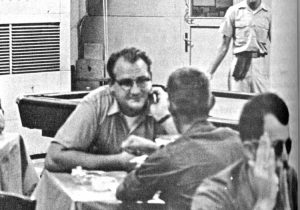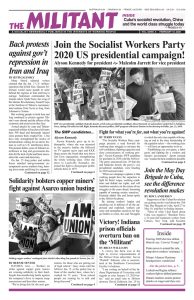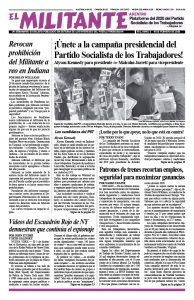
One of Pathfinder’s Books of the Month for January is Cointelpro: The FBI’s Secret War on Political Freedom by Nelson Blackstock. The extent of this decadeslong FBI disruption campaign against labor and political groups was exposed by the Socialist Workers Party’s historic legal and political fight against it. The excerpt below from Chapter 2: “Inciting violence: ‘It should be an interesting experience for Mr. Halstead’” covers the 1968 visit by SWP presidential candidate Fred Halstead to Vietnam to talk to GIs about the U.S. rulers’ war, and how the FBI’s efforts to disrupt it failed. Copyright © 1975 by Pathfinder Press. Reprinted by permission.
Early in 1946 a young sailor named Fred Halstead was stationed on a ship off the coast of China. World War II had just ended, but on the mainland of China the fighting had not stopped. A civil war was raging.
Back in Washington the rulers of this country were very interested in the outcome of that struggle. They would have liked to send their army in to back up Chiang Kai-shek’s crumbling forces, but their attempts to stall the demobilization of American troops after the war provoked massive protests among the GIs. It was clear that large-scale U.S. military intervention in China was out of the question.
Two decades later when the United States began committing thousands of troops to another Asian country in an attempt to hold back a revolution, Fred Halstead remembered what he had seen while he was in the navy. He was convinced that there were important lessons for the growing movement against the war in Vietnam.
In an interview, Halstead talked about this and about some revelations contained in the Cointelpro papers. Halstead was the Socialist Workers party candidate for president in 1968. During the campaign he made a trip to Vietnam. It now turns out the FBI had tried to sabotage that trip.
Among the documents turned over to the SWP under federal court order is evidence that the FBI wrote a “news story” that it sought to have placed in the military press.
The FBI’s purpose was to provoke violence against the socialist presidential candidate during his visit to Vietnam. “It should be an interesting experience for Mr. HALSTEAD when he encounters the men who have served both their own country and others in the interest of freedom,” the FBI’s article concluded.
Before discussing that experience, Halstead described what he had seen at the close of the Second World War.
“I was attached to a ship that was part of the Seventh Fleet in Chinese waters. Ostensibly, we were there to repatriate Japanese troops,” Halstead said.
“But after unloading our passengers in Japan, we found ourselves loading up again. This time with Chinese troops, which we took up to a port in northern China. This was part of the use of the American navy to assist Chiang’s offensive in the Chinese civil war.
“Well, most of us didn’t know there was such a thing as a civil war in China until we found ourselves more or less involved in it.”
The GIs had just finished one war, and they didn’t like the idea of getting into another one. Soon a protest movement developed.
“I remember walking into the Red Cross building in Shanghai where GIs would go to get coffee and hamburgers,” Halstead said. “There I saw this big banner with the words: ‘GIs Unite! We want to go home!’” …
They held some big demonstrations. There was one in Manila and another in Shanghai. The message got through, and orders soon came in to return to the United States.
“This made an impression on me that I didn’t forget. That you could organize among GIs,” Halstead remarked. …
When the movement against United States involvement in Vietnam began to develop, Halstead became one of its leaders. He joined the staff of the New York Fifth Avenue Vietnam Peace Parade Committee upon its inception in 1965, and he remained there until he left to run for president in 1967. …
The SWP’s candidate went to Vietnam as part of the socialist strategy to try to inject the war into the presidential campaign as the major issue.
“We demanded the immediate withdrawal of the American forces as the only way to end the killing over there and as the only legal and moral thing for the United States to do,” Halstead recalled.
“That year there was a tendency on the part of some in the antiwar movement to get into electoral activity as a substitute for antiwar demonstrations. Through this campaign we encouraged the antiwar movement to stay in the streets.”
There was another reason for making the trip. “We wanted to illustrate to the antiwar movement that it could reach GIs,” Halstead said, “and we wanted to demonstrate to the GIs that the antiwar movement was on their side.” …
“We were interested in talking to the American GIs who were on the scene,” Halstead said. “They had a right to vote and to listen to what the candidates had to say. They also had a right to have an opinion on the war — a greater right than any American citizen, including the president. I went there to ask them what that opinion was.”
What did he find? “The overwhelming majority of them were not willing to suddenly join the peace movement, but they weren’t supporters of the war either,” Halstead remembered.
They were mainly confused, looking for answers, still making up their minds. “That was all the more reason for the antiwar movement to have the stance and attitude that they were interested in reaching GIs — we’re on their side,” Halstead observed. …
Halstead explained that he was a candidate from the United States who was active in the antiwar movement. He said that he thought this country never belonged in Vietnam and should get out immediately.
“I was received in a courteous and sometimes friendly way,” Halstead remembered. “Never in a hostile way.”
Is there any evidence that the FBI was successful in its goal of getting their story about Halstead into the military press in order to provoke an attack? The item was never picked up and printed as far as Halstead knows.

